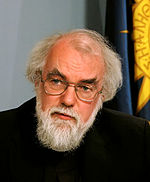Rowan Williams, Date of Birth, Place of Birth
TweetRowan Williams
Archbishop of Canterbury (2002–2012)
 Date of Birth: 14-Jun-1950
Date of Birth: 14-Jun-1950
 Place of Birth: Swansea, Wales, United Kingdom
Place of Birth: Swansea, Wales, United Kingdom
Profession: poet, politician, professor, theologian, Anglican priest
Nationality: United Kingdom
Zodiac Sign: Gemini 
About Rowan Williams
- Rowan Douglas Williams, Baron Williams of Oystermouth, (born 14 June 1950), is a Welsh Anglican bishop, theologian and poet.
- He was the 104th Archbishop of Canterbury, a position he held from December 2002 to December 2012.
- Previously the Bishop of Monmouth and Archbishop of Wales, Williams was the first Archbishop of Canterbury in modern times not to be appointed from within the Church of England. Williams' primacy was marked by speculation that the Anglican Communion (in which the Archbishop of Canterbury is the leading figure) was on the verge of fragmentation over disagreements on contemporary issues such as homosexuality and the ordination of women.
- Williams worked to keep all sides talking to one another.
- Notable events during his time as Archbishop of Canterbury include the rejection by a majority of dioceses of his proposed Anglican Covenant and, in the final General Synod of his tenure, his unsuccessful attempt to secure a sufficient majority for a measure to allow the appointment of women as bishops in the Church of England. Having spent much of his earlier career as an academic at the universities of Cambridge and Oxford successively, Williams speaks three languages and reads at least nine.
- After standing down as Archbishop, Williams took up the positions of Master of Magdalene College, Cambridge, in 2013, and Chancellor of the University of South Wales in 2014.
- He also delivered the Gifford Lectures at the University of Edinburgh in 2013. Justin Welby succeeded Williams as Archbishop of Canterbury on 9 November 2012, being enthroned in March 2013.
- On 26 December 2012, 10 Downing St announced Williams' elevation to the peerage as a life baron, so that he could continue to speak in the Upper House of Parliament.
- Following the creation of his title on 8 January and its gazetting on 11 January 2013, he was introduced to the temporal benches of the House of Lords as Baron Williams of Oystermouth on 15 January 2013, sitting as a crossbencher.
Read more at Wikipedia
See Also
- Famous People's Birthdays on 14 June, United Kingdom
- Famous People's Birthdays in June, United Kingdom
- Famous poet's Birthdays on 14 June, United Kingdom
- Famous poet's Birthdays in June, United Kingdom
- Famous politician's Birthdays on 14 June, United Kingdom
- Famous politician's Birthdays in June, United Kingdom
- Famous professor's Birthdays on 14 June, United Kingdom
- Famous professor's Birthdays in June, United Kingdom
- Famous theologian's Birthdays on 14 June, United Kingdom
- Famous theologian's Birthdays in June, United Kingdom
- Famous Anglican priest's Birthdays on 14 June, United Kingdom
- Famous Anglican priest's Birthdays in June, United Kingdom

